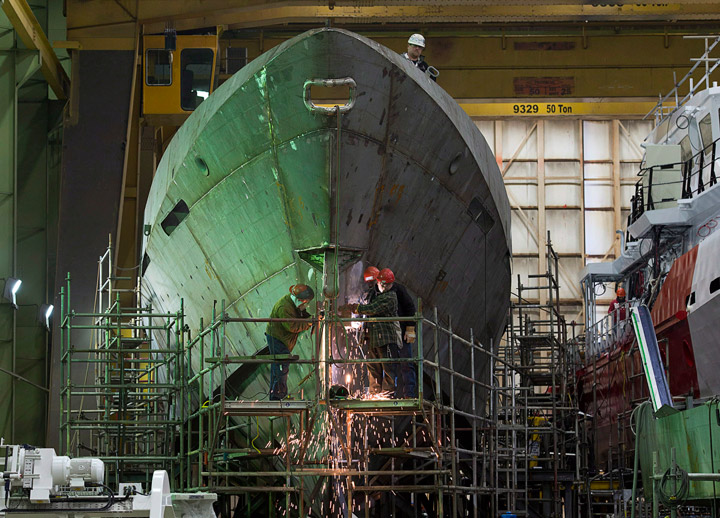OTTAWA – The parliamentary budget office used access-to-information to obtain a document about a $3.1-billion national shipbuilding project after the defence department repeatedly refused its requests.

What’s more, a draft version of the document – the ‘statement of operational requirement’ for arctic offshore patrol ships – was once posted online, but then taken down.
The 52-page unclassified document from May 2009 outlines the department’s vision for six to eight arctic offshore patrol ships to “exercise sovereignty” in Canada’s waters.
The statement outlines the ships’ features including the ability to break one metre of first-year ice, a light organic helicopter to provide ice navigation support, and details about security challenges such as human and narcotics smuggling.
It also reveals the project is behind schedule. The delivery of the first ship was expected to be 2014, but the government now says construction is set to begin in 2015.
The budget watchdog office sought since February to obtain the statement but was told several times in writing by deputy minister Richard Fadden the information “falls outside the scope of the mandate” of the office.
The budget watchdog office – created by the Conservatives under accountability legislation – cannot legally compel the government to release information.
But there are legal repercussions under the Access to Information Act, which any Canadian can use. The budget office filed an information request for the most recent version of the document at the end of July, and received it on Sept. 19.
Opposition MPs are decrying the government secrecy.
“It’s unbelievable that our Parliamentary Budget Officer had to resort to an access to information request just to do his job,” said Liberal defence critic Joyce Murray.
“At some level I understand their secrecy because there has been such a trail of fiscal and management incompetence when it comes to military procurement that they are resorting to hiding anything and everything they can.”
A spokeswoman for Defence Minister Rob Nicholson deferred questions about the ships to the department.
Treasury Board President Tony Clement said decisions to release documents are made by department officials.
“I certainly made it clear that we should always be cooperating within the bounds of our obligations to the Parliamentary Budget Officer,” said Clement.
“Clearly there was a difference of opinion in this case, but looks like it’s all’s well that ends well.”
Officials within the PBO are looking to do a cost estimate of the first-of-their-kind ships, which are supposed to break through thin ice, navigate slushy waters and act as patrol ships.
Parliamentary Budget Officer Jean-Denis Fréchette, who took over from Kevin Page and interim PBO Sonia L’Heureux in August, refused an interview request but wrote in an email that he encourages his staff to use “various means” to obtain information.
He said he has set aside funds from the office’s $2.8-million budget to pay for access-to-information fees. Each request costs $5, but can increase depending on time and volume of the request.
“I am also working on parliamentary avenues that could remove obstacles to obtaining information from the government,” wrote Fréchette.
“The example of AOPS is telling – the information we requested through an information request pursuant to our legislation was denied, but the same information was then provided when we filed a request via ATI (access to information).”
NDP defence critic Jack Harris believes it’s going to be a challenge to ensure the most efficient ships are built for the best price.
“The public has to have confidence that the process is beneficial to the taxpayer. Having the PBO with access to this document, the ability to do his own evaluation, bring in expertise from other parts of the world who know about this type of activity, can only inform the public debate and the proper Parliamentary scrutiny,” he said.
“If (Department of National Defence) didn’t give it out, in my opinion, they didn’t give it out because they didn’t want to give it out.”
Alain Blondin, deputy director of communications for the Navy, originally told Global News the statement of requirement was published but taken down once the contract was awarded to Irving Shipbuilding Inc. in Halifax.
Irving was awarded a $288-million contract in March for the “definition” phase of the project, prior to construction in 2015.
Blondin followed up to say he was mistaken and the document was never published. “I went to the wrong places for the information and there (were) some misunderstandings,” he said.
Defence spokeswoman Jocelyn Sweet then confirmed the draft was taken down once Irving was selected, and a new version of the statement of requirement is in progress.
A cached webpage posts a link to the statement of requirement draft dated May 12, 2008. The AOPS website currently features a few paragraphs about the project such as its speed and 25-year capacity.
Michael Byers, who holds the Canada Research Chair in global politics and international law, said he doesn’t believe there is anything in the statement of requirement that poses a threat to national security.
Byers wanted to use the information for research in order to investigate whether the ships are in the best interests for Canada. He is skeptical because he says at a maximum speed of 17 knots they are slow vessels that aren’t designed to break hard ice.
“There’s nothing in the document that needed to be kept secret,” said Byers.
“In fact we could have had an easier, more informed debate about these ships had this document been made public, and I think that would have been in everyone’s interest because obviously we want to have a well-equipped Navy and you can’t have a debate about capabilities and plans unless the information is on the table.”
Below: Read the full statement of operational requirement



Comments